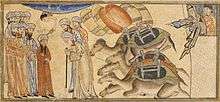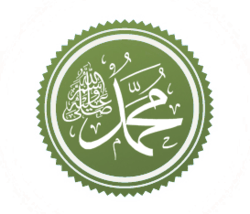Bahira
| Part of a series on |
| Muhammad |
|---|
|
Views |
|
Perspectives |
|
Related |
|

Bahira (Arabic: بحيرى, Syriac: ܒܚܝܪܐ), or "Sergius the Monk" to the Latin West, was a Syriac or Arab[1] Arian, Nestorian or possibly Gnostic Nasorean[2] monk who, according to tradition, foretold to the adolescent Muhammad his future as a prophet.[3][4] His name derives from the Syriac bḥīrā, meaning “tested (by God) and approved”.[5]
Islamic tradition
The story of Muhammad's encounter with Bahira is found in the works of the early Muslim historians Ibn Hisham, Ibn Sa'd al-Baghdadi, and Muhammad ibn Jarir al-Tabari, whose versions differ in some details. When Muhammad was either nine or twelve years old, he met Bahira in the town of Bosra in Syria during his travel with a Meccan caravan, accompanying his uncle Abu Talib ibn ‘Abd al-Muttalib.[3] When the caravan was passing by his cell, the monk invited the merchants to a feast. They accepted the invitation, leaving the boy to guard the camel. Bahira, however, insisted that everyone in the caravan should come to him.[4] Then a miraculous occurrence indicated to the monk that Muhammad was to become a prophet.
It was a miraculous movement of a cloud that kept shadowing Muhammad regardless of the time of the day. The monk revealed his visions of Muhammad's future to the boy's uncle (Abu Talib), warning him to preserve the child from the Jews (in Ibn Sa'd's version) or from the Byzantines (in al-Tabari's version). Both Ibn Sa'd and al-Tabari write that Bahira found the announcement of the coming of Muhammad in the original, unadulterated gospels, which he possessed.[3]
Bibliography
- Maulana Muhammad Ali (2002), The Holy Qur'an: Arabic Text with English Translation and Commentary, New Addition, Ahmadiyya Anjuman Isha’ at Islam Lahore Inc., Ohio, USA.
- Osman Kartal (2009), The Prophet’s Scribe Athena Press, London (a novel)
- B. Roggema, The Legend of Sergius Baḥīrā. Eastern Christian Apologetics and Apocalyptic in Response to Islam (The History of Christian-Muslim Relations. Texts and Studies 9; 2008) (includes editions, translations and further references).
- K. Szilágyi, Muhammad and the Monk: The Making of the Christian Baḥīrā Legend, Jerusalem Studies in Arabic and Islam 34 (2008), in press.
- Abel, A. (1935) “L'Apocalypse de Bahira et la notion islamique du Mahdi” Annuaire de l'Institut de Philologie et d'Histoire Orientale III, 1-12. Alija Ramos, M.
- Griffith, S. H. (1995). "The legend of the Monk Bahira; the Cult of the Cross and lconoclasm". In P. Canivet & J-P. Rey. Muhammad and the Monk Bahîrâ: Reflections on a Syriac and Arabic text from early Abbasid times. 79. Oriens Christianus. pp. 146–174. ISSN 0340-6407. OCLC 1642167.
- Griffith, S. H. (January 2000). "Disputing with Islam in Syriac: The Case of the Monk of Bêt Hãlê and a Muslim Emir". Hugoye: Journal of Syriac Studies. 3 (1).
References
- ↑ Al-Masudi, "Muruj adh-dhahab wa ma'adin al-jawhar" ,وقال المسعودي، ت : 345 هـ إن بحيرا الراهب على دين المسيح عيسى بن مريم، واسم بحيرا في النصارى سرجس، وكان من عبد القيس.
- ↑ John of Damascus, Des hérésies, chap. CI.
- 1 2 3 Abel, A. "Baḥīrā". Encyclopaedia of Islam, Second edition. Brill. Brill Online, 2007 [1986].
- 1 2 Watt, W. Montgomery (1964). Muhammad: Prophet and Statesman, p. 1-2. Oxford University Press.
- ↑ Roggema, Barbara. "Baḥīrā." Encyclopaedia of Islam, THREE. Edited by: Gudrun Krämer, Denis Matringe, John Nawas, Everett Rowson. Brill Online, 2014 [2011]. Accessed July 12, 2014.
